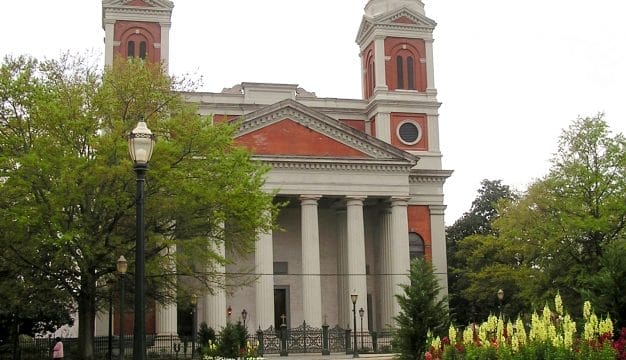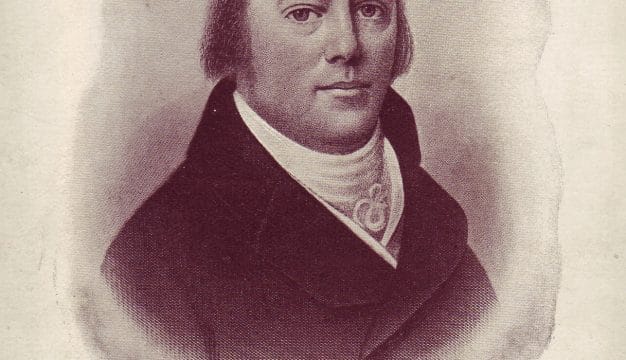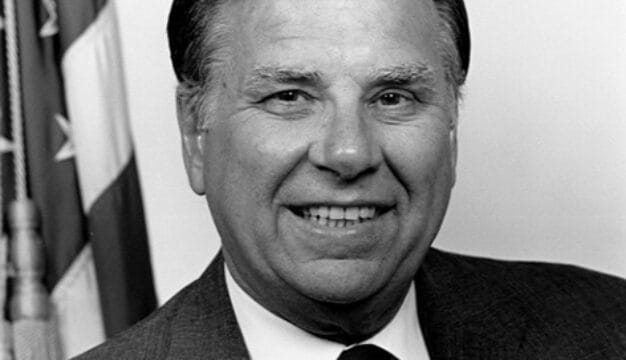Alexander B. Meek
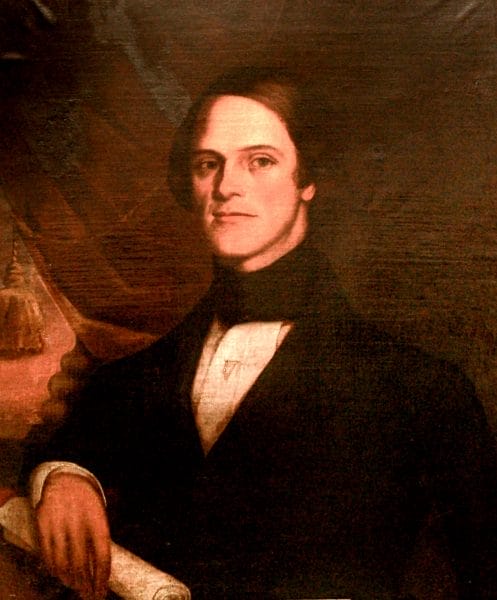 Alexander Beaufort Meek
Alexander Beaufort Meek (1814-1865) was a poet, historian, orator, attorney, public official, and journalist, and was the foremost literary figure in Alabama in the pre–Civil War period. He was born in Columbia, South Carolina, on July 17, 1814, to Samuel Mills Meek, a physician, and Anne McDowell Meek, and came with his family on a 46-day journey to Tuscaloosa, Alabama, in 1819. He attended local schools and at the age of 15 was enrolled at the University of Georgia. When the newly established University of Alabama opened in 1831 in Tuscaloosa, he was among the first students enrolled, entering with advanced standing. He graduated from the University of Alabama with a bachelor’s degree in 1833, read law in the office of local attorney Peter Martin, and was admitted to the Alabama State Bar in 1835. He served as associate editor of the Tuscaloosa newspaper Flag of the Union for a year and was awarded a master of arts degree from the University of Alabama in 1836. From February to May 1836, he served as an ensign (equivalent to a modern second lieutenant) in the Seminole War in an Alabama unit that had been mustered into federal service. Upon his return he was appointed attorney general of Alabama by Gov. Clement Comer Clay, serving about six months until the November election. He succeeded his mentor, Peter Martin, who had been elevated to the bench.
Alexander Beaufort Meek
Alexander Beaufort Meek (1814-1865) was a poet, historian, orator, attorney, public official, and journalist, and was the foremost literary figure in Alabama in the pre–Civil War period. He was born in Columbia, South Carolina, on July 17, 1814, to Samuel Mills Meek, a physician, and Anne McDowell Meek, and came with his family on a 46-day journey to Tuscaloosa, Alabama, in 1819. He attended local schools and at the age of 15 was enrolled at the University of Georgia. When the newly established University of Alabama opened in 1831 in Tuscaloosa, he was among the first students enrolled, entering with advanced standing. He graduated from the University of Alabama with a bachelor’s degree in 1833, read law in the office of local attorney Peter Martin, and was admitted to the Alabama State Bar in 1835. He served as associate editor of the Tuscaloosa newspaper Flag of the Union for a year and was awarded a master of arts degree from the University of Alabama in 1836. From February to May 1836, he served as an ensign (equivalent to a modern second lieutenant) in the Seminole War in an Alabama unit that had been mustered into federal service. Upon his return he was appointed attorney general of Alabama by Gov. Clement Comer Clay, serving about six months until the November election. He succeeded his mentor, Peter Martin, who had been elevated to the bench.
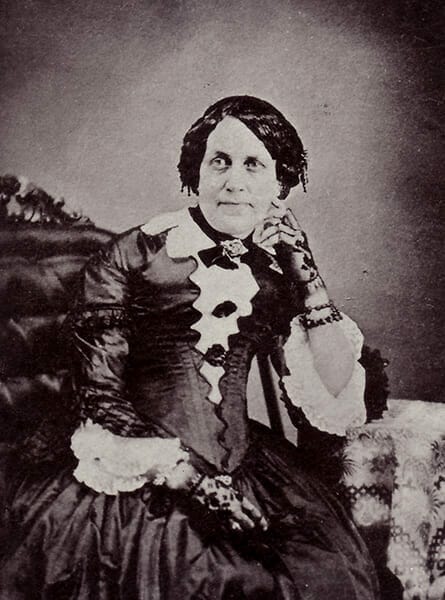 Caroline Lee Hentz
Meek gained a reputation as an orator early on, delivering addresses at colleges and before learned societies. His first formal address was at an event celebrating the University of Alabama’s alumni in 1836. Many of his addresses were published by the societies or schools for which he spoke, and many more were collected and published in his book Romantic Passages in Southwestern History (1857), so titled because the territories west of Georgia were known as the Southwest at the time. The themes in nearly all of his orations and addresses were combinations and variations on the subjects of education and literature in the South, Alabama history and Alabama Indians, and national and sectional patriotism. On July 4, 1838, Meek delivered an oration in poetic form titled “Day of Freedom,” which was published by the Ciceronian Club of Tuscaloosa. Meek later included “Day of Freedom” in his poetry collection Songs and Poems of the South (1857). In 1839 Meek launched a literary monthly magazine, The Southron, which ran for only six issues owing to lack of subscriptions, sharing the fate of many literary publications of the time. Meek was able to attract contributions from well-known southern authors, including William Gilmore Simms, Augustus Baldwin Longstreet, and Richard Henry Wilde. Contributors also included several Alabama authors who later reached national fame, notably novelist Caroline Lee Hentz.
Caroline Lee Hentz
Meek gained a reputation as an orator early on, delivering addresses at colleges and before learned societies. His first formal address was at an event celebrating the University of Alabama’s alumni in 1836. Many of his addresses were published by the societies or schools for which he spoke, and many more were collected and published in his book Romantic Passages in Southwestern History (1857), so titled because the territories west of Georgia were known as the Southwest at the time. The themes in nearly all of his orations and addresses were combinations and variations on the subjects of education and literature in the South, Alabama history and Alabama Indians, and national and sectional patriotism. On July 4, 1838, Meek delivered an oration in poetic form titled “Day of Freedom,” which was published by the Ciceronian Club of Tuscaloosa. Meek later included “Day of Freedom” in his poetry collection Songs and Poems of the South (1857). In 1839 Meek launched a literary monthly magazine, The Southron, which ran for only six issues owing to lack of subscriptions, sharing the fate of many literary publications of the time. Meek was able to attract contributions from well-known southern authors, including William Gilmore Simms, Augustus Baldwin Longstreet, and Richard Henry Wilde. Contributors also included several Alabama authors who later reached national fame, notably novelist Caroline Lee Hentz.
With the failure of The Southron, Meek returned to his law practice and public speaking engagements until 1842, when he was appointed probate judge of Tuscaloosa County. When James Knox Polk won the presidential election of 1844, Meek was chosen to carry the electoral vote of Alabama to Washington. After completing his duties, he sought employment in Washington and found a position as law clerk to the solicitor of the U.S. Treasury. In 1846 Meek was appointed the U.S. attorney for the Southern District of Alabama by President Polk and became a resident of Mobile for the next 18 years. When his federal appointment expired with the inauguration of the Whigs in March 1849, he became associate editor of the Mobile Register until 1853, when he was elected to the Alabama House of Representatives. As chairman of the education committee, he submitted the 1854 report that led to the establishment of the public school system in Alabama.
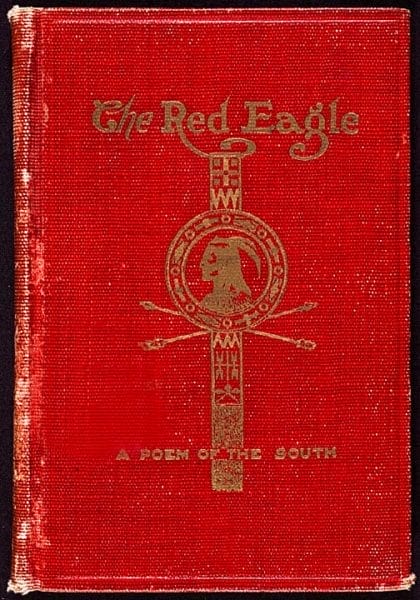 The Red Eagle: A Poem of the South
In 1855, after his legislative term ended, Meek published his most ambitious work, a book-length narrative poem, The Red Eagle: A Poem of the South, set during the Creek War of 1813-14 and with the Creek chief William Weatherford (Red Eagle) as the hero. One of the earliest works of American literature with an Indian protagonist, Red Eagle is divided into three cantos, beginning with the Fort Mims massacre of August 30, 1813, and ending with Weatherford’s surrender to Gen. Andrew Jackson near Wetumpka, Elmore County. Although the poem is built around the historical incidents of the Creek War, Meek, in true romantic style, included a love story. Red Eagle has been called one of the best long narrative poems written in the South during the pre–Civil War period.
The Red Eagle: A Poem of the South
In 1855, after his legislative term ended, Meek published his most ambitious work, a book-length narrative poem, The Red Eagle: A Poem of the South, set during the Creek War of 1813-14 and with the Creek chief William Weatherford (Red Eagle) as the hero. One of the earliest works of American literature with an Indian protagonist, Red Eagle is divided into three cantos, beginning with the Fort Mims massacre of August 30, 1813, and ending with Weatherford’s surrender to Gen. Andrew Jackson near Wetumpka, Elmore County. Although the poem is built around the historical incidents of the Creek War, Meek, in true romantic style, included a love story. Red Eagle has been called one of the best long narrative poems written in the South during the pre–Civil War period.
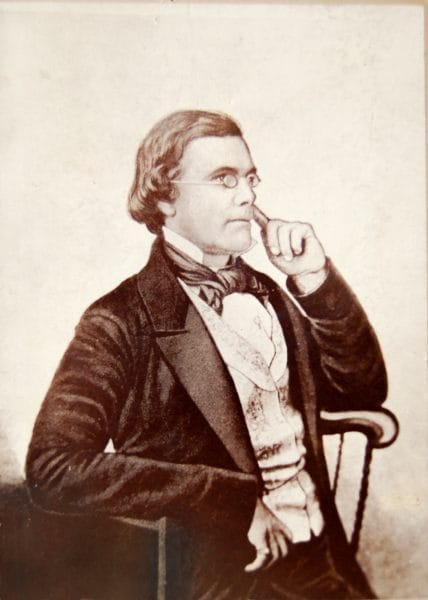 Alexander Meek
On September 3, 1856, Meek married Mobile widow Emma Donaldson Slatter. That same year, he served as a presidential elector for James Buchanan. The next year, Meek published two books: Romantic Passages in Southwestern History, a collection of orations and historical sketches delivered or published previously; and Songs and Poems of the South, a collection of prior compositions, bringing together the best of his poems and some pieces that had appeared in failed periodicals. Meek was re-elected to the Alabama Legislature in 1859 and was chosen Speaker of the House. During this session, which ran from November 14, 1859, to February 27, 1860, the legislature passed a resolution asking the governor, Andrew B. Moore, to call for a secession convention in the event that the Republicans emerged victorious in the November 1860 presidential election. With the election of Republican Abraham Lincoln, Moore called for the election of 100 delegates to Alabama’s Secession Convention, which took place on January 7, 1861. On January 14, 1861, four days after the delegates voted for secession, the governor called a special session of the legislature. Meek took part in the meeting, but he opposed the secession of the southern states from the United States and took no part in politics after the end of his term in the legislature.
Alexander Meek
On September 3, 1856, Meek married Mobile widow Emma Donaldson Slatter. That same year, he served as a presidential elector for James Buchanan. The next year, Meek published two books: Romantic Passages in Southwestern History, a collection of orations and historical sketches delivered or published previously; and Songs and Poems of the South, a collection of prior compositions, bringing together the best of his poems and some pieces that had appeared in failed periodicals. Meek was re-elected to the Alabama Legislature in 1859 and was chosen Speaker of the House. During this session, which ran from November 14, 1859, to February 27, 1860, the legislature passed a resolution asking the governor, Andrew B. Moore, to call for a secession convention in the event that the Republicans emerged victorious in the November 1860 presidential election. With the election of Republican Abraham Lincoln, Moore called for the election of 100 delegates to Alabama’s Secession Convention, which took place on January 7, 1861. On January 14, 1861, four days after the delegates voted for secession, the governor called a special session of the legislature. Meek took part in the meeting, but he opposed the secession of the southern states from the United States and took no part in politics after the end of his term in the legislature.
During the early years of the Civil War, Meek remained at home, caring for his ailing wife and serving briefly as a trustee for the University of Alabama. After attending a meeting in Tuscaloosa in June 1863, he returned home to find his wife seriously ill, and three weeks later she died. In the following year, Meek published two war poems in the Mobile Register. In January 1864 he visited his brother’s family in Columbus, Mississippi, and apparently planned to make his home with them. In September 1864 he married Eliza Jane Cannon, his brother’s mother-in-law. Meek lived little more than a year after his marriage, dying on November 1, 1865, at age 51. He is buried in Friendship Cemetery in Columbus, Mississippi.
Further Reading
- Nixon, Herman Clarence. Alexander Beaufort Meek: Poet, Orator, Journalist, Historian, Statesman. Auburn, Ala.: Polytechnic Institute Historical Studies, 1910.
- Williams, Benjamin Buford. “Alexander Beaufort Meek, Poet and Historian,” in A Literary History of Alabama: The Nineteenth Century. Rutherford, N.J.: Fairleight Dickinson University Press, 1979, 39-57.

